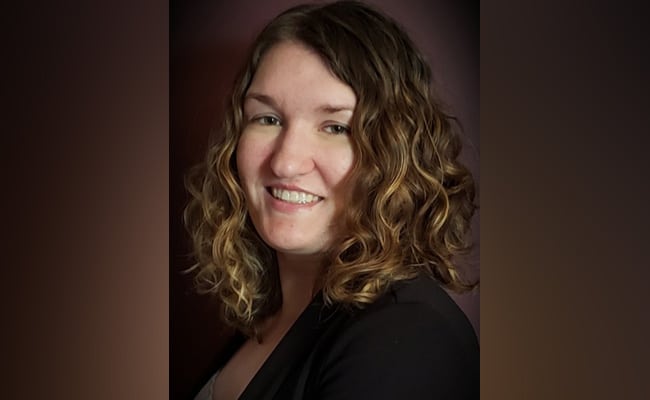ESE Master’s Student and GSAC-ISD President Michele Appledorn Crusades to Protect Our Natural Resources
Michele Appledorn knows a thing or two about environmental issues.
Appledorn, who is expected to graduate with a MEng in Energy Systems Engineering, Integrative Systems + Design, in 2023, grew up in the countryside of a small town on the west coast of the Lower Peninsula of Michigan.
“Over my lifetime, I’ve experienced firsthand how growing environmental issues are negatively impacting the natural resources and wildlife I have loved since childhood as well as the lifestyles of affected residents.,” she said.
Sustainable Engineering
Her desire to protect our natural resources led her to earn a BSE in Mechanical Engineering at U-M in 2021 while also earning a designation in PISE (Program in Sustainable Engineering).
During this time, she participated in the Graham Sustainability Scholars Program. The connections, knowledge, and support she received as a member of this program inspired her to enroll in ESE and also earn an INCOSE certification in systems engineering.
Appledorn currently serves as the president of the Graduate Student Advisory Committee – Integrative Systems + Design (GSAC-ISD). As a summer intern for The Aspen Institute, she researched and assessed building retrofits and energy efficiency solutions to be scaled nationwide and developed a resource guide and report.
She is also a member of the Graduate Student Advisory Committee within the College of Engineering (GSAC), the University of Michigan’s ISD DEI Committee, the Society of Women Engineers (SWE), and the Graduate Society of Women Engineers (GradSWE).
Award Winner
In recognition of her excellent efforts, Appledorn recently earned three awards:
- Distinguished Leadership Award – Graduate Students
- Richard F. and Eleanor A. Towner Prize For Distinguished Academic Achievement Prize – ISD
- Willie Hobbs Moore Achievement Award – Women in Science & Engineering
“It’s an honor to have been recognized with these awards,” she said.
Improving Accessibility and Inclusivity
Being unexpectedly forced into the role of a virtual student at the start of COVID in March 2020 allowed Appledorn to experience firsthand the importance of expanding accessibility and inclusivity within the University of Michigan community, especially for remote and neurodivergent students as well as those who are working, ill, or quarantined. Since the 2020-21 academic year, she has been actively involved in advocating for increased accessibility and inclusivity of campus events and resources for students that are traditionally overlooked and underrepresented in our community, including remote students, students impacted by illness, and students with disabilities.
This includes creating pathways to allow flexibility in how students can participate and engage in opportunities of interest, including multi-modal events and meetings to accommodate students who are unable to attend in-person as well as closed-captioning services for those who may have a learning disability or are hearing impaired.
“As a result of my own journey in STEM, I am committed to and passionate about advancing STEM education as well as inclusion and accessibility of educational resources,” she said. “I love volunteering in these critical spaces for underrepresented communities to help bridge important gaps and reduce barriers and am glad to know that others appreciate and see the importance of this work. I hope others will feel empowered to get involved within their communities to help make them more inclusive and accessible for the current as well as future generations.”
It’s not uncommon for students belonging to these groups to feel disconnected from and inferior to their peers while also experiencing higher rates of accessibility issues to voice their concerns, receive support, or even participate in beneficial programs and events, she said. This can affect course participation and performance and can result in students dropping out of school.
“It’s important to identify and bridge these gaps to better serve all members of our student community and leverage underrepresented perspectives and experiences to advance DEI efforts in an equitable and beneficial manner,” she said. “My desire to bridge these gaps inspired me to serve as the first remote member of several student organizations and committees over the course of my graduate studies, including GSAC-ISD.”
Removing Barriers
As a graduate of a rural public school that lacked resources for STEM extracurriculars and advanced classes, Appledorn is familiar with the barriers faced by students from traditionally underrepresented communities. Outreach and education, as well as advocacy for increased resources and accessibility, are critical to removing these barriers.
“As an active member of the undergraduate SWE chapter at the University of Michigan, I have had the opportunity to contribute to a variety of STEM education and outreach opportunities, including developing and facilitating workshops for elementary-aged students, middle schoolers, high schoolers, undergraduates, and girl scouts as well as traveling to Washington DC last month to advocate for increased support for and equity within STEM education,” she said. “Through my involvement with this organization over the past few years, I’ve learned how supportive and inclusive a student organization can be as well as how this can be translated into other areas within our community.”
Cap It Off, Right!
After the conclusion of this semester, Appledorn expects to complete her capstone project in the fall.
“I’m excited to start the job search process to secure my first full-time position,” she said. “My goal is to work as an energy engineer in the analytics/consulting industry to help develop and implement sustainable solutions to increase the efficiency and resiliency of our infrastructure while supporting underserved and vulnerable communities by addressing equity issues and making positive impacts to the climate. I plan to pursue additional certifications and licenses in my desired field, including my PE (Professional Engineer) License, LEED (Leadership in Energy and Environmental Design) Certification, and CEM (Certified Energy Manager) Certification. In a few years, I may look into pursuing a doctorate degree in engineering.”
